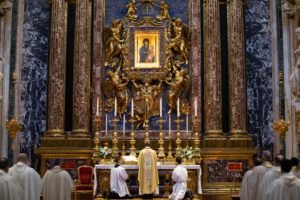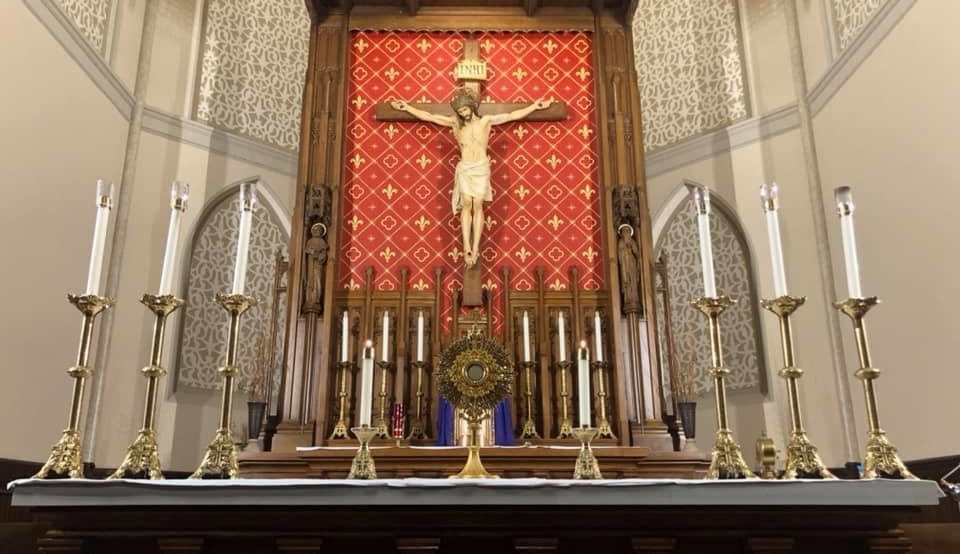Bishop supports regular extraordinary form celebrations for Chattanooga, warns against illicit Masses outside of Church
Bishop Richard F. Stika, working with Basilica of Sts. Peter and Paul rector Father David Carter, has authorized the addition of a traditional Latin Mass to the Basilica’s regular Sunday Mass schedule on a weekly basis.
This extraordinary form Mass will be offered at 11:30 a.m. each Sunday. A monthly Latin Mass was introduced at the basilica five years ago. The basilica also is adding a Mass in Spanish to its weekly celebrations. The Mass in Spanish will be at 7 a.m. on Sundays.
The basilica joins a growing list of Diocese of Knoxville churches that are now offering extraordinary form Masses.
“I am pleased to be able to extend the offering of the Latin Mass at the basilica on a weekly basis,” Bishop Stika said. “More than a decade ago, Pope Benedict XVI declared a return to the Traditional Form as valid, and as a result we now have at least five parishes in our diocese that offer Masses in Latin.”
Bishop Stika hopes the addition of the extraordinary form Mass will appeal to an increasing number of Latin Mass-goers who are looking for the traditional celebration. He also would like Chattanooga parishioners to know the diocese is diverse enough to meet their Mass needs.
Bishop Stika said Chattanooga Catholics should be aware that a Society of St. Pius X Mass and a Society of St. Pius X priest to celebrate that Mass, which was planned for Pentecost Sunday in Hixson, was not approved by the Diocese of Knoxville.
“In recent months, some of the faithful in and around the Chattanooga area have become sympathetic to the positions of the Society of St. Pius X, and enough of them have expressed an interest in securing a Society of St. Pius X priest to ‘minister’ to them that a Mass was planned on Sunday, May 31, in Hixson,” Bishop Stika said. “I have not given my approval to any activity of the Society of St. Pius X in the Diocese of Knoxville. Communion with the Chair of Peter is a constitutive part of Roman Catholicism — something the Society of St. Pius X accepts in principle but rejects in practice. As Pope Benedict XVI said, the Society of St. Pius X has ‘no canonical status,’ ‘no legitimate ministry,’ and ‘has no facul ties from any bishop, is not part of the divinely ordained hierarchical structure of the Church, and all its priests are suspended a divinis.”
In 1970, Archbishop Marcel Lefebvre founded a priestly society called the Society of St. Pius X (SSPX) to respond to seminarians and priests who wanted a seminary education that was free from the turmoil of the time after the Second Vatican Council. This was done in full accordance with the laws of the Church at the time.

U.S. Conference of Catholic Bishops members gather for an extraordinary form Mass at the Basilica of St. Mary Major in 2019. Traditional Latin Masses increasingly are being added to church Mass schedules.
In 1988, however, as a response to what he described as errors that had crept into the Catholic Church after the Second Vatican Council, Archbishop Lefebvre and Bishop Antonio de Castro Mayer consecrated four bishops without the permission of St. John Paul II. The illicit episcopal consecrations resulted in the excommunication of the bishops involved and caused the Society of St. Pius X to fall into a canonically irregular status.
The excommunications of the surviving bishops were lifted in 2009 by Benedict XVI, and since then negotiations “to rediscover full communion with the Church” have continued between the Society of St. Pius X and the Vatican. When he remitted the excommunications, Pope Benedict noted that “doctrinal questions obviously remain, and until they are clarified the Society has no canonical status in the Church and its ministers cannot legitimately exercise any ministry.”
In March 2017, Pope Francis gave diocesan bishops or other local ordinaries the authorization to grant priests of the Society of St. Pius X the ability to celebrate licitly and validly the marriages of the faithful who follow the society’s pastoral activity. Bishop Stika has not done so in the Diocese of Knoxville.
Also, in September 2015 Pope Francis announced that the faithful would be able to validly and licitly receive absolution from priests of the Society of St. Pius X during the Jubilee Year of Mercy. This ability was later extended indefinitely by Pope Francis in his 2016 apostolic letter Misericordia et misera.
Following Pope Benedict XVI’s desire to reconcile these faithful to the Church by liberalizing the use of the traditional Latin Mass, now called the extraordinary form, and in order to accommodate the legitimate desires of the faithful who have asked for the extraordinary form, Bishop Kurtz and then Bishop Stika provided for this form of the Roman Rite in several locations throughout the Diocese of Knoxville.
The addition of traditional Latin Masses has been well received and has grown to the point that it now seems opportune to offer them on a weekly basis, Bishop Stika said.
“It also seems that a weekly Latin Mass will mitigate many of the causes for which people might seek out the ministry of the Society of St. Pius X. Knowing that any priest may celebrate the extraordinary form at any time without the diocesan bishop’s permission as per the motu proprio Summorum Pontificum, but that any change to Sunday Mass times falls under my oversight, I have given Father Carter my backing to add the extraordinary form to the Basilica of Sts. Peter and Paul’s regular Sunday Mass schedule on a weekly basis,” Bishop Stika said.
“This Mass will be offered at 11:30 a.m. each Sunday as a “Missa Cantata” or “Sung Mass.” It is my earnest desire that this will answer the legitimate aspirations of the faithful and forestall anyone from defecting from full communion with the Church,” Bishop Stika added.
The bishop said priests should always have a “pastoral solicitude for the lost sheep” with a desire to restore them to full communion in the one fold of the Catholic Church. He noted that parishioners who express a desire for the traditional expressions of the Roman Rite, but whose desires can’t be accommodated, should be directed to the basilica.

